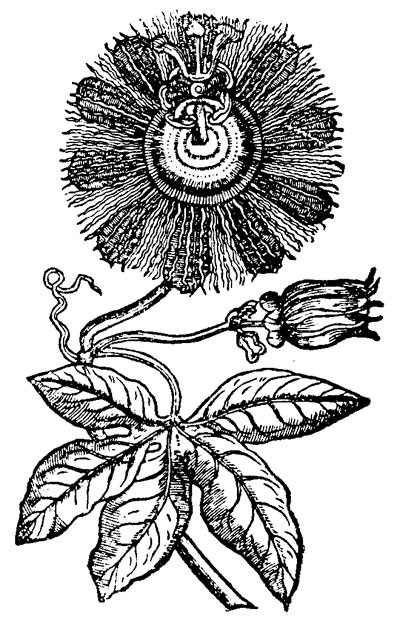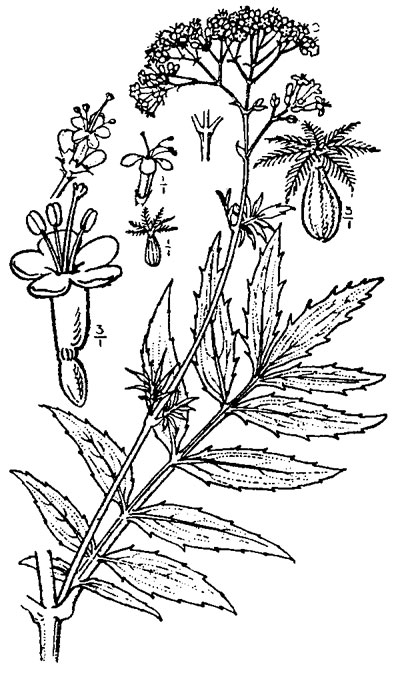 |
| Milky oat seeds make a tonic that can help strengthen the nervous system. Illustration from Handbook of Plant and Floral Ornament from Early Herbals, by Richard G. Hatton, Dover Publications, N.Y., 1960. |
By Deb Soule
Some of the stresses humans are experiencing today are more complex than they were 100 years ago. The threat of nuclear war is once again in the forefront of many people’s minds. Poverty, violence, racism, sexism and many other oppressive situations continue to cause much suffering to people around the world. I chose the topic for this herb column as a result of the United States’ attack on Iraq. The stress levels in my clients, co-workers, family and friends are much higher than usual. Ongoing stress eventually wears the body and spirit down and depletes one’s vital life force, which in turn leads to chronic exhaustion and illness. Herbs, alongside other healing practices such as prayer, meditation, relaxing baths, nourishing food and therapeutic body work, can help ease stress.
Western herbalists generally call herbs that benefit the nervous system ‘nervines.’ Different categories of nervines exist, but all help improve our ability to cope with life’s challenges. Some of the herbs listed below fit into more than one category.
Nerve tonics are herbs that strengthen, tonify and restore balance and harmony to the nervous system. They often contain minerals such as calcium and magnesium, and B vitamins, which support the health of the nervous system. Some common nerve tonics include milky oat seed, skullcap, lavender, linden, lemon balm, rose petals, wood betony, St. Johnswort, blue vervain and ashwagandha root. These herbs can be used safely in various combinations for one to three months or longer.
Nervine relaxants directly relax the nervous system, ease mental and physical tension and anxiety and promote restful sleep. This category includes St. Johnswort, California poppy, catnip, motherwort, passionflower, lemon balm, lavender and chamomile.
Nervine sedatives sedate nerve function. They are much milder than pharmaceutical sedatives and have very few side effects. Nervine sedatives are used short term, often help people who have insomnia, and include valerian root, hops and California poppy.
Nervine stimulants gently activate the nerve endings by increasing circulation to the brain and other areas of the body. They also offer nutrients that awaken and enliven the nervous system. The nervine stimulants listed below do not over-stimulate the body the way caffeine, sugar or other drugs can. Some stimulating nervines include rosemary, ginger and peppermint. These herbs can be used in teas, soups or syrups as needed. Rosemary can also be used as an essential oil in bath water or the tea can be rubbed directly into one’s hair.
 |
| Passionflower relaxes the nervous system, eases tension and can promote restful sleep. Illustration from Handbook of Plant and Floral Ornament from Early Herbals, by Richard G. Hatton, Dover Publications, N.Y., 1960. |
Adaptogenic herbs help the body to adapt to different types of stress and lower cortisol levels. This category plays a crucial role in supporting a person with long-term stress or a person living with a chronic health condition. Some adaptogenic herbs include schisandra berries, Siberian and American ginseng, astragalus, codonopsis, licorice, reishi mushroom, ashwagandha root and sacred basil. Consulting with an herbalist or naturopathic doctor can be most helpful in designing a specific herbal program for a person experiencing long-term stress.
As part of my training in western herbalism, I studied with a few herbalists who were trained in Traditional Chinese Medicine (TCM). One TCM concept that helps in understanding stress is how the heart becomes disturbed energetically when the mind is disturbed. Times of war are deeply disturbing to most people’s minds and hearts. The three western herbs I have found helpful for easing a disturbed heart are hawthorn berries, rose petals and reishi mushroom. These herbs can be taken together as a tincture or separately in teas, syrups, soups or elixirs. The smell of rosewater, rose essential oil or a pure rose fragrance is also very soothing, comforting and healing to one’s heart. These types of fragrances can be used directly on the body or in massage oils, baths or essential oil infusers.
Nervine tonics and relaxants are especially helpful for the stresses of daily life. One of the most restorative herbs to the nervous system is oats. The medicinal properties of oats (Avena sativa) are most potent during the green, milky seed stage. At Avena we tie baskets around our waists and go into the oat field and strip the seeds directly into our baskets. We then tincture them fresh or lay them out to dry. Daily, long-term use of oats, as a tea, tincture or non-alcohol glycerin, is deeply nourishing, moistening and rebuilding to the nervous system. Those who feel exhausted, depleted physically or emotionally, or “at the end of their rope” will benefit from daily use of oats. (People with Celiac’s disease should avoid oats.)
I favor a combination of skullcap and oats for short- or long-term support. Lemon balm is an appropriate addition for anyone who feels overwhelmed. Lavender is specific when a person experiencing acute or chronic stress begins to feel emotionally shut down. Linden leaf and flower strengthen and relax the nervous system and are specific for a person with raised blood pressure. Each of these herbs can be used in different combinations, depending on the individual’s needs.
Passionflower, a relaxing nervine, helps people whose minds are overactive, like a radio left on all the time. Often, people with overactive minds get into bed and cannot go to sleep. Passionflower can be taken a few times during the day, before bed, and during the night if you awake. People who get tension headaches as a result of stress may find nervines such as California poppy, wood betony and lavender helpful in combination with passionflower.
 |
| Valerian can sedate the nervous system and promote sleep. Illustration from Handbook of Plant and Floral Ornament from Early Herbals, by Richard G. Hatton, Dover Publications, N.Y., 1960. |
Valerian root can sedate the nervous system and help a person sleep. A small percentage of people experience valerian as a stimulant. If you are interested in using valerian as a sleep aid and have never used it before, begin by taking 5 to10 drops of the tincture or glycerin and see how your body responds. If you do not have a stimulant response, then increase the dosage over a few days to 1/2 to 1 tsp. for adults. Hops and valerian go well together to treat insomnia. California poppy is especially useful for quieting and relaxing the body when physical or emotional pain exists and can be taken alone or with valerian and hops. (Anyone who is using an antidepressant and is interested in using herbs should consult with an herbalist or naturopath first.)
During times of stress, people often feel as though they have nothing solid to stand upon; as if the bottom has given out; the ground beneath their feet feels shaky. The adaptogenic herbs can be used two to four times per day for three to six months or longer to help someone feel like they are standing on solid ground. Many of the adaptogenic herbs listed earlier in the article are used as root teas, tinctures or in soups. Roots support and firmly ground a person during stressful times.
A few adaptogenic herbs that are not roots include schisandra berries, sacred basil and the reishi mushroom. Schisandra berries (see the March-May 2003 issue of The MOF&G for a full article on schisandra) are especially supportive for people experiencing grief, despair and hopelessness. If you are interested in growing schisandra vines, contact Ernie Glabau at Entwood Farm and Nursery in Burnham, Maine, for plants ([email protected]; 948-3281).
Another leafy adaptogenic herb that grows well in Maine is sacred basil. This spicy, aromatic herb can be tinctured in alcohol or glycerin, or used fresh or dry in teas. The reishi mushroom (Ganoderma tsugae) grows on dead hemlock trees or hemlock stumps. It can be dried and tinctured or cooked in soups. The mushroom itself is then composted, as it is too tough to eat; only the tincture or soup is consumed. (Refer to Christopher Hobbs’ book, Medicinal Mushrooms, or Paul Stamet’s Mycomedicinals for more information about mushrooms.)
The nervine and adaptogenic herbs are truly allies for us during unsettled and stressful times. Their regular use strengthens both body and spirit. They bring us in touch with the beauty of the natural world and of our own precious lives.
About the author: Deb is the founder of Avena Botanicals and the Avena Institute in West Rockport, Maine. She also wrote A Woman’s Book of Herbs. You can visit her website at www.avenaherbs.com. This article is for information only; please consult a health care practitioner if you have a serious medical problem.
